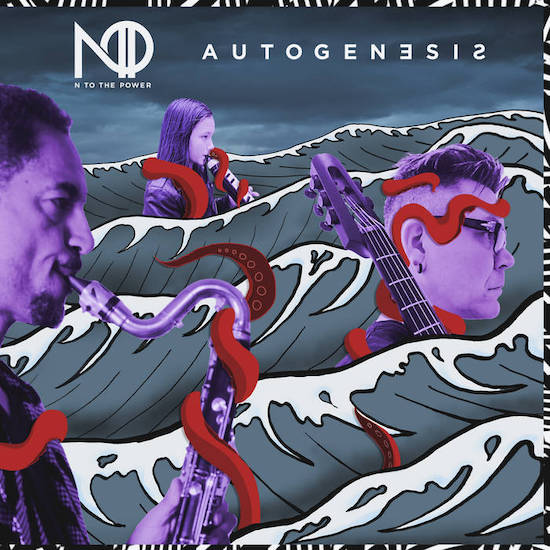“When everything you care about suddenly feels threatened, how do you respond to that as an artist, as a creative person?”
It’s a question many artists will be wrestling with every day – and for N To The Power, the collaborative project of Blake Leyh and Tony Jarvis, it proved to be the catalyst for their music making together.
If the instrumental tracks presented on Autogenesis carry a message of protest, the musicians let the music do the talking. On listening, it would appear that the New York City-based ensemble have justified their resolve to channel the negative and oppressive energy they were feeling into the project and have taken their time to achieve what they set out to. The process of creating the debut N To The Power album was more than three years in the making. The musicians on the album cover of Autogenesis pull from the depths between waves, playing their instruments, yet wrapped in the grip of tentacles of an unseen submerged sea monster to reach the surface.
Leyh has provided sound design for TV programmes including The Wire and films by Spike Lee and John Waters, while Jarvis was a member of SST-signed avant-funk punk group Tar Babies and studied under Roscoe Mitchell of the Art Ensemble Of Chicago. The broad spectrum of their previous activities on stage and screen productions adds depth and space, in parallel with the scope of influences, at times minimal, at others fiendish funk and tranced out dub passages.
The album opens with an introductory blast of trumpet before the beat kicks in with a tempo that does not shift in gear a great deal throughout. ‘Supertonic’ offers expanding avenues and diversions, at times playful and uplifting as the music flows to a natural rhythm.
What is added and how the tracks build around these frameworks is where the journey begins. From the minimalism of these frameworks comes the hypnotic flourishes of an ensemble including horns, vibraphone, djembe percussion and cello.
Taking its name from a headline inspired by a Stephen Hawking quote about the existential threat posed by elements discovered at the Large Hadron Collider, ‘The God Particle’ riffs on a one-two motif, tribal drumming and echoed horns with syncopated guitar lines – always threatening to erupt, but never quite exploding. This restraint, rather than resolving itself, evaporates at the song’s conclusion.
‘Marrakesh Memosphere’ introduces Afrobeat-influenced, tightly knit guitar riffs and percussion that pay homage to north African gnawa music. With horns breaking out at intervals, the overall feel is like a Fela Kuti track being covered by the Penguin Café Orchestra.
‘To The Jackpot’ adds static shards of prog guitar lines to a marching rhythm accentuated by additional flute and cello. The beat goes on, even when the arrangement opens out like a starry sky with light keys and playful New Orleans jazz-inspired horn duels.
The group’s take on a Bill Evans standard shows another inspiration and while their presentation is contemporary, the pace of their music dates back further. ‘Peace Piece’ is a Satie-like wander of slow-burning movements and N To The Power’s version plays it relatively straight, albeit not out of keeping with their own arrangements. Here, it is a twelve-minute rendition, although the group have expressed their vision to expand the track to an hour-long movement for live performance.
While we may have to wait to experience the latter, the long-form meditative passages of music on Autogenesis offer plenty to spend time with. “To me it doesn’t feel decadent to be figuring out how to make seven-against-five drum and guitar patterns in a room in Harlem. It feels like a response,” Leyh added. Like the pseudo-mathematical equation of the group’s name, it is an open question, dealing with an unknown quantity, with no conclusion, offering no limit to the possibilities.


